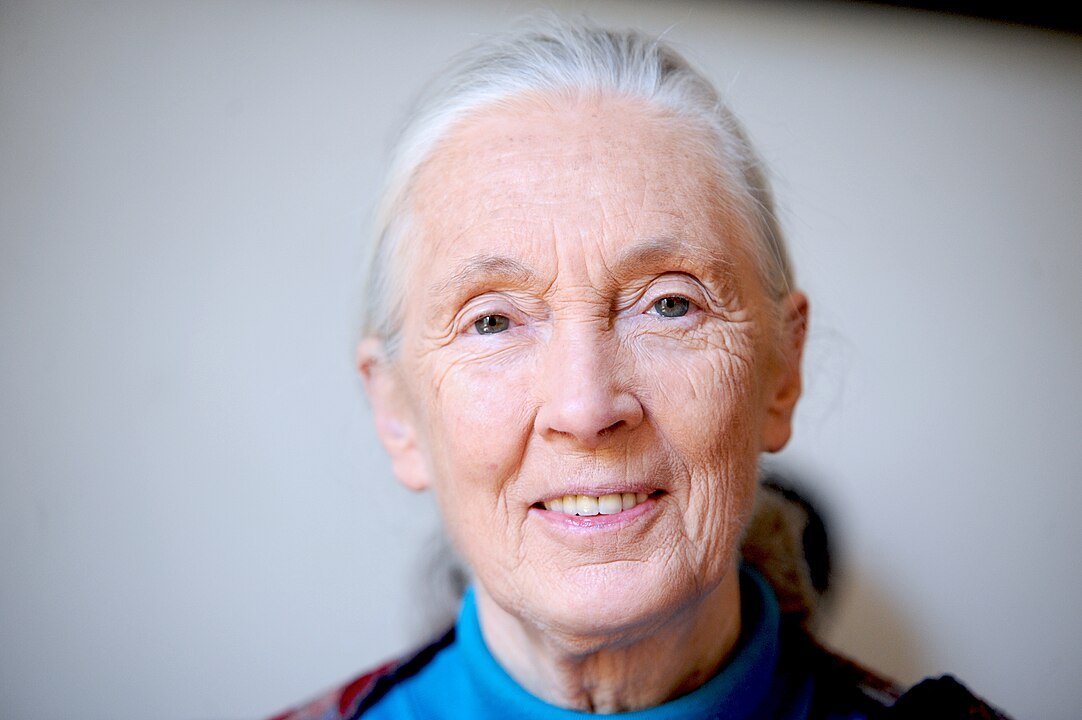Who is Jane Goodall?
Jane Goodall was one of the most influential primatologists, anthropologists, and conservationists in the world. Known for her groundbreaking research on wild chimpanzees in Gombe Stream National Park, Tanzania, she revolutionized the scientific understanding of primates and their behaviour. Goodall was not just a scientist—she was also a tireless advocate for wildlife conservation, environmental protection, and youth empowerment. Her passing on October 1, 2025, at the age of 91 marks the end of an extraordinary life devoted to science, conservation, and advocacy for the planet.
Biography: Early Life of Jane Goodall
- Birth: Jane Goodall was born on April 3, 1934, in London, England.
- From an early age, she showed a deep curiosity about animals. At just over a year old, she was given a toy chimpanzee named Jubilee, sparking a lifelong fascination with primates.
- Without formal higher education at first, she worked as a secretary and waitress to save money for her dream—to visit Africa.
Journey into Science: Struggles and Determination
In 1957, Goodall travelled to Kenya, where she met the renowned archaeologist and anthropologist Louis Leakey. Impressed by her passion and patience, Leakey hired her as his secretary and later sent her to study chimpanzees in Tanzania.
Her path was not easy:
- She lacked formal training, so many scientists doubted her observations.
- As a young woman in the 1960s, she faced gender biases in a male-dominated field.
- Living in the forests of Gombe was often dangerous, with isolation, illnesses, and logistical challenges.
Yet, her determination and keen eye for detail helped her persevere.
Groundbreaking Work and Discoveries
Jane Goodall’s research completely reshaped how humans view primates:
- Tool Use in Chimpanzees (1960):
She was the first to observe chimpanzees making and using tools—a skill once believed unique to humans.
- Complex Social Structures:
She revealed that chimpanzees have strong family bonds, social hierarchies, and emotional connections.
- Aggression and Warfare:
Goodall also discovered darker behaviours, including territorial conflicts and violence among chimpanzee groups.
- Close Human-Animal Connection:
She emphasized that chimpanzees share more than 98% of human DNA, challenging long-standing ideas about the separation between humans and animals.
Her research was published in several landmark books and scientific papers, making her one of the most respected scientists of her generation.
Life Work and Achievements
- The Jane Goodall Institute (1977): Founded to promote wildlife research, community-led conservation, and sustainable development.
- Roots & Shoots (1991): A youth-led program inspiring young people to engage in conservation, humanitarian work, and environmental stewardship.
- UN Messenger of Peace (2002): Recognized globally for her tireless advocacy.
- Books: Author of many influential works such as In the Shadow of Man, The Chimpanzees of Gombe, and Reason for Hope.
- Awards: Goodall has received over 40 honorary degrees and numerous awards, including the Kyoto Prize, the Hubbard Medal of the National Geographic Society, and the Templeton Prize.
Quotes by Jane Goodall
- “What you do makes a difference, and you have to decide what kind of difference you want to make.”
- “The least I can do is speak out for those who cannot speak for themselves.”
- “Change happens by listening and then starting a dialogue with the people who are doing something you don’t believe is right.”
Inspirations and Lessons from Jane Goodall’s Life
Jane Goodall’s journey is full of valuable lessons for everyone:
- Follow Your Passion Relentlessly: Despite lacking money or degrees, she followed her dream and became a world icon.
- Patience and Observation Lead to Breakthroughs: Her quiet patience in the forest led to discoveries that changed science.
- Never Stop Learning: She pursued her Ph.D. in ethology at Cambridge University despite having no prior degree.
- Advocacy Beyond Science: She transformed her role from scientist to global advocate, proving that knowledge must be used to create change.
- Youth Empowerment: Her Roots & Shoots program teaches that young people can be powerful changemakers.
Legacy
Jane Goodall was more than a scientist—she was a symbol of hope for conservation and the environment. Her life’s work has inspired generations to care for animals, protect the planet, and act with compassion.
Even in her 90s, she continues to travel, give talks, and inspire the world with her unwavering dedication.
Conclusion
Jane Goodall’s death is a profound loss to the global community, but her life remains an enduring symbol of courage, compassion, and conviction. From her childhood fascination with animals to becoming the most celebrated primatologist in history, she proved that one person’s determination can change the world.
Her words, “What you do makes a difference,” will echo forever, urging us all to carry forward her mission of protecting life on Earth.
She was a living reminder that one individual, with courage and determination, can change the world.

Leave a Reply